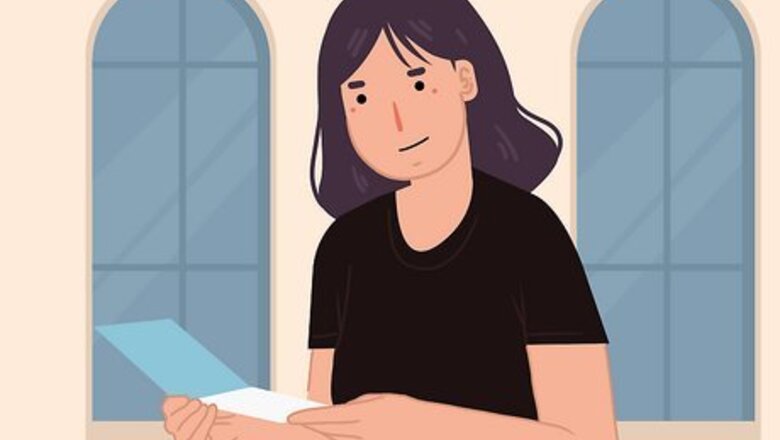
views
Offering Your Condolences and Support

Write a sympathy card. These can be found in drugstores, card shops, and gift shops. You can also use a blank card to write a message of sympathy to the bereaved — the important thing is what you write inside. If you knew the deceased even a little, you can write a small note of a happy time you enjoyed with them. Otherwise, stick to offering words of sympathy and support for the bereaved. Go for something simple, but not impersonal: “Please accept my condolences on your loss. I only met Albert once and briefly, but I know how much he meant to Chad (my co-worker and friend) and the rest of your family. Please know that you will be in my thoughts [and/or prayers]. Sincerely, Jan White.”

Bring a gift as indicated by the family. Read the obituary in the paper or online, or ask a family member you know well. Depending on the family’s wishes, you may have the option of sending flowers or making a donation to a designated charity, disease research foundation, or hospice. While not required, it is a nice gesture and will be greatly appreciated by the bereaved. It’s also a nice gesture to ask the bereaved if you can bring food to the wake (or in the days before or after), to give them one less thing to worry about. Or, offer the gift of your time by offering to help with setup, cleanup, or other useful tasks.

Talk to other people in the receiving line. Depending on the type of wake it is, the casket holding the deceased person may be present. If so, you’ll usually start your visit by entering the line to stop at the casket. Be subdued but not somber — you can chat with the people near you, since that's a key part of what wakes are for. Simple small talk is fine: “Hi, I’m Jan, and I work with Albert’s grandson, Chad. I didn’t know Albert well, but I know from Chad what a caring and fun-loving person he was.”
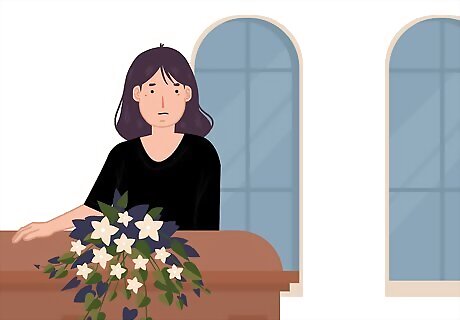
Pay your respects to the deceased (if the casket is present). If you wish, you can kneel down to pray at the casket for a moment. It’s also perfectly acceptable just to stop to view the body for a moment, then move on to greet the bereaved. Even if you never met the person before, show respect for the life they lived and the loss felt by those who loved them. As you approach the casket, there will often be a place where you can leave sympathy cards or other gifts for the bereaved. If you have them, that's where they should go.

Tailor your conversations to suit the nature of the wake. Wakes can vary greatly in regards to atmosphere. Some will include more joviality, with happy stories about the deceased. Others will remain more solemn in nature. Get a “feel for the room” before you begin to mingle with family members and other attendees. Take your cues mainly from the people you know, especially if they were close to the deceased. If they are smiling and laughing, you can as well (but respectfully). If they’re crying, be a source of consolation and comfort.
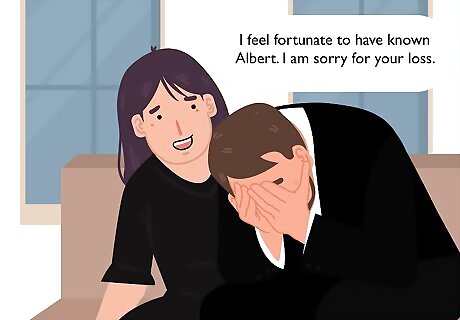
Give the bereaved simple, but not trite, words of support. As you approach the grieving family members, introduce yourself as needed. Speak briefly and compassionately, and tell them how sorry you are for their loss. If you are at a loss for words, don't offer a canned response. Instead, simply offer those grieving a hug or a shoulder to cry on if they need it. Stay away from comments along the lines of “it’s for the best,” “they’re in a better place,” “I know how you’re feeling,” "At least they're no longer in pain," "only the good die young." or “it will get easier over time.” Don’t tell them how to feel; instead, praise the deceased (if you knew them at all) or just offer your support. Instead, say something simple and supportive, like "I feel fortunate to have known Mark. I am sorry for your loss."
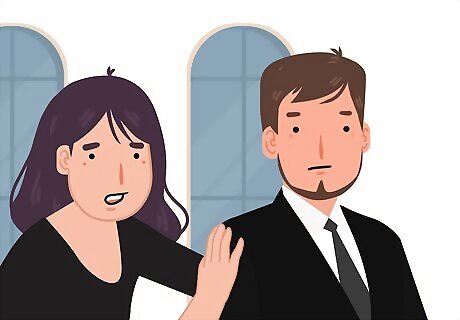
Listen attentively and sympathetically. Wakes, like funerals, are for the living, not the dead. While bereaved loved ones are sometimes quiet and reflective, often they are eager to talk quite a bit about the deceased. Never force them to talk, but if they do want to, listen and pay attention to them. Especially when you don’t know the deceased well enough to add many memories or reflections yourself, your job is to be a sympathetic ear and perhaps a shoulder to cry on.

Share pleasant memories (or just pleasantries) with other attendees. After you’ve offered your sympathies to the close family, you can look around for other people you may know. Even if you don’t recognize anyone else, feel free to introduce yourself and chat for a bit. Talk fondly about the deceased (if you knew them well enough to do so), or just listen to their stories and smile. There may be photos or a slideshow with pictures of the deceased during happier times. If so, you can look at these with others and say: "Hey, I remember that!" or "Bob always had such a great sense of humor," or "Wow, I'll really miss those Monday night football games over at Larry's place." Wakes are for reminiscing and remembering the good times. You may be asked how you knew the deceased by other attendees. Keep your answer simple, like "We volunteered at the same organization. He was a great team leader."
Arriving and Departing Respectfully

Dress conservatively in subdued colors. You don't have to wear black, but this also isn't the time to wear the wildest, brightest thing you own. Blacks, greys, browns, tans, and muted blues are all acceptable. In terms of types of outfits, think of what you might wear to a wedding, but with an even more muted color palette. Everything should be clean, pressed, and simple. Shoes should not be athletic shoes, sandals, or very high heels. These rules apply to children, too. As with weddings, you don’t want seem like you’re upstaging the “star” of the proceedings with a bright or outrageous outfit. Avoid neon colors or bright reds, yellows, and oranges. Likewise avoid clothing with cheery prints like flowers or bold patterns. Likewise, it would be rude to go causal and wear jeans.
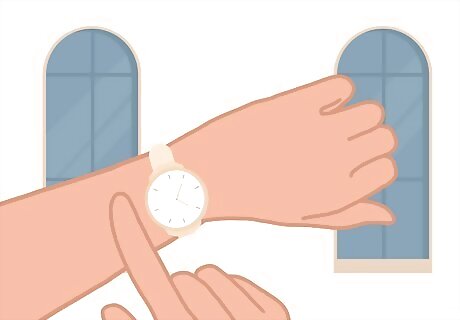
Arrive at your convenience, but with the bereaved in mind. Wakes often last several hours, so that everyone gets a chance to stop in. Only close loved ones tend to stay the whole time, so you don’t need to plan to be there for hours. At the same time, though, it's disrespectful to be in a rush to leave. If you are going there to support a bereaved friend or colleague, think about — or just ask — when they might need you there the most. You might even offer to help set up beforehand or close up at the end.
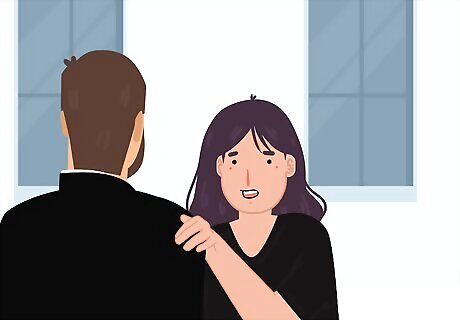
Enter the wake venue quietly and soberly. Wakes usually aren’t as somber as funerals, but that doesn’t mean you should strut in with a smile and a hearty “How ya doin’?” Enter quietly, with a respectful and compassionate countenance. Turn off your cell phone or set it to silent before you enter so as not to cause any distractions. Then, politely thank any greeters or anyone who opens the door for you. The goal is to be inconspicuous. You want the bereaved to notice your presence on their time, instead of announcing your own arrival through your words, actions, or attitude.

Sign the guest book, if one is provided. Some wakes will have guestbooks, and some won’t. If there is one, it will usually be located right by the entrance. Take a quick moment to sign it, and especially if you don't know many people there, add a small note of how you knew the deceased or know the bereaved.

Depart quietly when you feel the time is right. After you have finished spending time with other attendees, you may proceed to make a quiet exit. Unless you feel it would be disruptive to do so, quietly mention to one of the bereaved that you’re leaving. Offer a final consolation, or just a polite goodbye. Say something like “It was an honor to attend, and please once again accept my condolences for your loss. Please give me a call if I can be of any help. Good evening.” If it feels right to do so, you can also go up to the casket for a final goodbye.
Deciding Whether to Attend

Don’t assume that you need to be invited. Wakes typically are open to anyone who knew the deceased, even just a little, or who is just close to some of the bereaved. Keep a lookout for information in published obituaries, or ask someone you know well for details on the wake. Wakes, however, can vary by tradition — some are smaller affairs, while some resemble large parties. If you’re not sure, ask someone you know.

Go if doing so will bring comfort to the bereaved. Will it bring a quick smile to someone’s face to see you there? Will they be eager to share a story or two about the deceased with you? Don’t feel like it is disrespectful to the deceased to show up at their wake when you hardly knew them. Instead, remember that it shows respect to be there as a comforting presence for the deceased’s loved ones.

Stay away if you think you will cause pain for the bereaved. If you’ve had some sort of falling-out with the grieving family, or otherwise suspect that your presence will cause discomfort, it’s best for all involved that you not attend. You won’t show respect for the deceased by hurting their loved ones with your presence at the wake. Just pay your respects to the deceased privately, on your own time. If you’re not sure, talk to a family member of the deceased with whom you’ve maintained a good relationship.



















Comments
0 comment